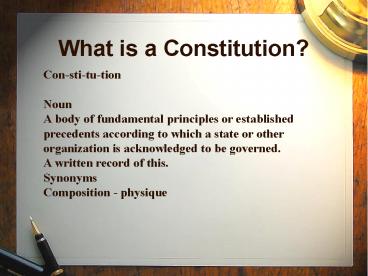What is a Constitution? - PowerPoint PPT Presentation
Title:
What is a Constitution?
Description:
Title: PowerPoint Presentation - The Bill of Rights The First 10 Amendments to the Constitution Author: Madison Middle School Last modified by – PowerPoint PPT presentation
Number of Views:303
Avg rating:3.0/5.0
Title: What is a Constitution?
1
What is a Constitution?
Con-sti-tu-tion Noun A body of fundamental
principles or established precedents according to
which a state or other organization is
acknowledged to be governed. A written record of
this. Synonyms Composition - physique
2
The Bill of RightsThe First 10 Amendments to the
Constitution
- Take notes on the slides as they appear.
- Draw pictures to represent at least five of the
amendments.
3
1st Amendment
- The 1st Amendment guarantees freedom of religion,
speech, the press, assembly, and petition. - This means that we all have the right to
- practice any religion we want to
- to speak freely
- to assemble (meet)
- to address the government (petition)
- to publish newspapers, TV, radio, Internet
(press)
4
(No Transcript)
5
2nd Amendment
- The 2nd Amendment protects the right to bear
arms, which means the right to own a gun.
6
3rd Amendment
- The 3rd Amendment says No soldier shall, in time
of peace be quartered in any house, without the
consent of the owner, nor in time of war, but in
a manner to be prescribed by law. - This means that we cannot be forced to house or
quarter soldiers.
7
4th Amendment
- The 4th Amendment protects the people from
unreasonable searches and seizures. - This means that the police must have a warrant to
enter our homes. It also means the government
cannot take our property, papers, or us, without
a valid warrant based on probable cause (good
reason).
8
(No Transcript)
9
(No Transcript)
10
5th Amendment
- The 5th Amendment protects people from being held
for committing a crime unless they are properly
indicted, (accused) - You may not be tried twice for the same crime
(double jeopardy) - You dont have to testify against yourself in
court. (Self-incrimination)
11
6th Amendment
- The 6th Amendment guarantees a speedy trial (you
cant be kept in jail for over a year without a
trial) - an impartial jury (doesnt already think you are
guilty) - that the accused can confront witnesses against
them - the accused must be allowed to have a lawyer
12
7th Amendment
- The 7th Amendment guarantees the right to a
speedy civil trial. - A civil trial differs from a criminal trial. A
civil trial is when someone sues someone else. A
criminal trial is when the state tries to convict
someone of a crime.
13
8th Amendment
- The 8th Amendment guarantees that punishments
will be fair and not cruel, and that
extraordinarily large fines will not be set.
14
9th Amendment
- All rights not stated in the Constitution and not
forbidden by the Constitution belong to the
people. - This means that the states can do what they want
if the Constitution does not forbid it.
15
10th Amendment
- The 10th Amendment states that any power not
granted to the federal government belongs to the
states or to the people.

